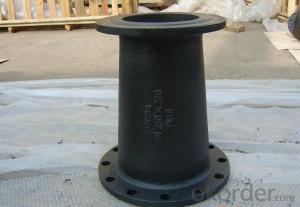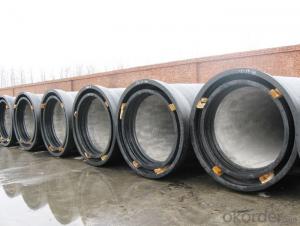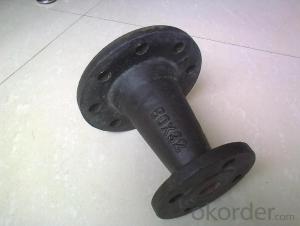Ductile Iron Pipe On Sale Made In China DN200
- Loading Port:
- Tianjin
- Payment Terms:
- TT or LC
- Min Order Qty:
- 1000 m
- Supply Capability:
- 10000 m/month
OKorder Service Pledge
OKorder Financial Service
You Might Also Like
1.Packaging & Delivery
Packaging Detail: | DN80-300 bundled with steel belt ( the bundle size see the product detail part) DN400-1200 are in bulk |
Delivery Detail: | at least 5days for MOQ |
2.Specifications
Ductile iron pipe comply with ISO2531/EN545
1)We are factory
2)Best quality
3)Competive price
4)On time delivery
3.Features:
Facilitating high resistance to loadings, pressure and vacuum with high tensile strength,
Enabling high resistance to corrosion,
Not requiring cathodic protection,
Less operating cost since cast pipes have larger nominal diameter than polyethylene pipes.
Being the best pipe in case of an earthquake, with its ability of resilience and resistance to impacts without deformation,
Long product life, exceeding 50 years,
Preserving the quality of water with healthy interior coating.
4.Applied Standards:
General Design | ISO 2531 |
Internal Lining | ISO 4179 |
External Coating | ISO 8179 |
Polyethylene Coating (Optional) | ISO 8180 |
5.Joint Types:
Push-on Type | TYT Type |
Standard Type |
6. Diameters:
Pipes | Ø80 – Ø1200 mm (L = 6m, and 5.7m) |
Fittings | Ø80 - Ø2200 mm |
7. Wall Thickness:
Pipes | C and K classes |
Fittings | Class K10 - K12 |
8.Test Pressures:
Pipes | for Ø80 - Ø300 mm | 50 bar / 40 bar |
for Ø350 - Ø600 mm | 40 bar / 30 bar | |
for Ø700 - Ø1000 mm | 32 bar / 25 bar | |
for Ø1100 - Ø2600 mm | 25 bar |
Fittings | for Ø40 - Ø300 mm | 25 bar (*) |
for Ø350 - Ø600 mm | 16 bar | |
for Ø700 - Ø2600 mm | 10 bar | |
(*16 bar for fittings with PN10 flanges) | ||
9.Materials:
Pipe | Ductile iron casting, minimum 420 MPa tensile strength |
Internal Lining | Concrete Lining, ISO 4179 |
Socket Internal 10.Lining | 200 micron epoxy coating |
External Coating | 70 micron bitumen coating on 130 gr/m2 zinc coating, ISO 8179 |
Fittings | Ductile iron casting, minimum 420 MPa tensile strength |
Internal Lining | Concrete Lining, ISO 4179 |
External Coating | 70 micron bitumen coating on 130 gr/m2 zinc coating, ISO 8179 |
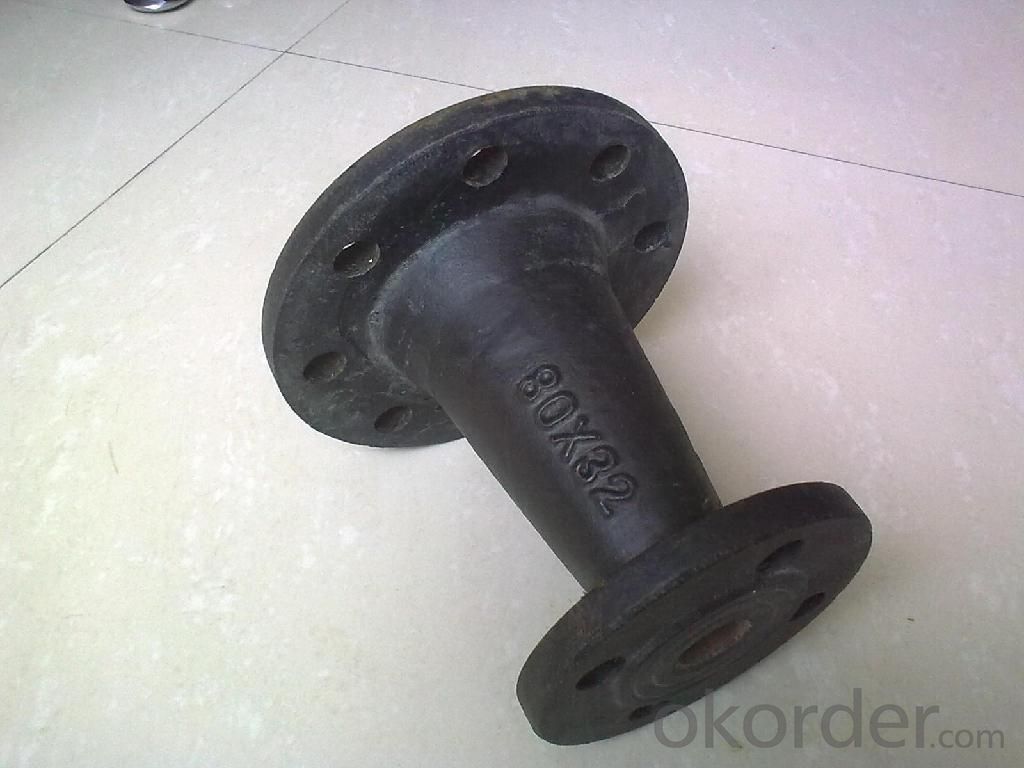
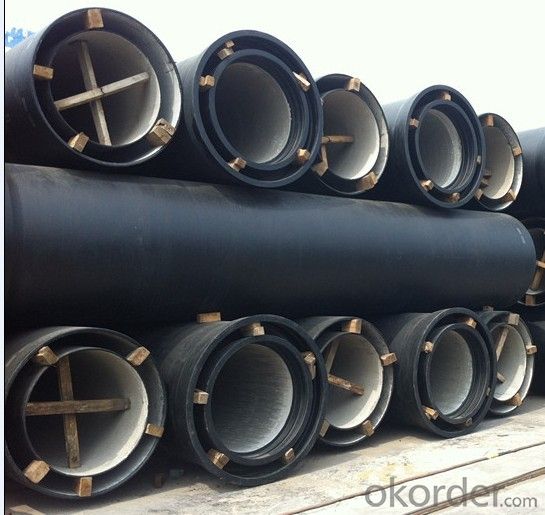
- Q:What is the expected joint restraint method for ductile iron pipes?
- The expected joint restraint method for ductile iron pipes is typically mechanical joints or push-on joints. These joints provide a secure and leak-free connection between the pipes, ensuring the stability and integrity of the pipeline system. Mechanical joints involve the use of rubber gaskets and bolts to tightly seal the joint, while push-on joints utilize a groove and rubber gasket system to create a watertight seal. Both methods offer excellent joint restraint capabilities, allowing for the effective transmission of fluids or gases through the pipeline without the risk of joint separation or failure. Additionally, these joint restraint methods also facilitate ease of installation and maintenance, making them a preferred choice for ductile iron pipe systems.
- Q:Ways of connecting ductile iron pipes
- Ductile iron pipes are all made of flexible interfaces.
- Q:Can ductile iron pipes be used for irrigation pivot systems?
- Indeed, irrigation pivot systems can utilize ductile iron pipes. Renowned for their robustness, longevity, and resistance to corrosion, ductile iron pipes are apt for numerous purposes, including irrigation. These pipes have the capability to withstand substantial water pressure, guaranteeing a dependable and enduring means of transporting water to irrigation pivot systems. Moreover, ductile iron pipes harmonize seamlessly with a variety of fittings and connectors commonly employed in irrigation systems, thereby facilitating effortless installation and upkeep. All in all, employing ductile iron pipes in irrigation pivot systems emerges as a pragmatic decision that ensures efficacious water distribution while minimizing the likelihood of pipe failure.
- Q:How does ductile iron pipe perform in areas with high soil settlement?
- Ductile iron pipe has gained a reputation for its exceptional performance in regions where soil settlement is significant. Thanks to its inherent strength and durability, it remains structurally intact under the pressures exerted by settling soil. The ductile iron pipe's flexible nature enables it to accommodate ground movements caused by soil settlement, thereby reducing the risk of pipe failure or damage. Its adaptability to these movements helps prevent cracks, leaks, and breaks that may occur in more rigid pipe materials. Furthermore, the strong resistance of ductile iron pipe to corrosion provides an additional advantage in areas with high soil settlement. It can withstand the corrosive effects of the soil and other environmental factors, ensuring the pipe system's longevity and reliability. In regions with substantial soil settlement, ductile iron pipe is often the preferred choice due to its ability to handle ground movements without compromising performance. Its strength, flexibility, and corrosion resistance make it an ideal solution for maintaining a robust and efficient water distribution system, even in challenging soil conditions.
- Q:Can ductile iron pipes be used for industrial applications?
- Yes, ductile iron pipes can be used for industrial applications. Ductile iron is a type of cast iron that has significantly improved mechanical properties, including increased ductility and strength, compared to traditional cast iron. These qualities make ductile iron pipes highly suitable for industrial applications where durability, strength, and resistance to external forces are crucial. Industrial applications often involve high-pressure water or fluid transportation, and ductile iron pipes are designed to withstand such conditions. They have excellent tensile strength, which means they can resist deformation and fractures, making them ideal for handling heavy loads and withstanding significant internal and external pressures. Additionally, ductile iron pipes have excellent corrosion resistance properties, making them highly suitable for industrial applications where exposure to harsh chemicals or corrosive substances is common. Their resistance to corrosion ensures a longer service life and reduces maintenance costs associated with pipe replacement or repairs. Furthermore, ductile iron pipes are known for their versatility and adaptability. They can be easily connected and integrated into existing infrastructure, making them a preferred choice for industrial applications. Their high strength-to-weight ratio allows for easy handling and installation, which is essential in industrial settings. In conclusion, ductile iron pipes are suitable for industrial applications due to their improved mechanical properties, corrosion resistance, and versatility. Their ability to withstand high pressures, resist deformation, and adapt to existing infrastructure make them an excellent choice for various industrial applications.
- Q:What is the expected pressure class for ductile iron pipes?
- The pressure class anticipated for ductile iron pipes may differ based on the particular use and project needs. In a general sense, ductile iron pipes are engineered to manage high-pressure situations and are typically offered in pressure classes spanning from 150 psi to 350 psi. These pressure classes signify the utmost operational pressure that the pipe can endure while preserving its structural soundness. To ascertain the suitable pressure class for ductile iron pipes in a specific scenario, it is crucial to refer to industry standards, guidelines, and project specifications.
- Q:How to distinguish flexible and rigid interfaces between cast iron pipe joints
- Rigidity is a way of connection that has been eliminated. Sealing is achieved by pouring cement into the spigot
- Q:What is the expected joint flexibility of ductile iron pipes?
- Due to the inherent material properties of ductile iron pipes, their expected joint flexibility is typically high. Ductile iron is renowned for its exceptional ductility, which enables it to deform without fracturing. This quality empowers ductile iron pipes to withstand external loads, ground movement, and pressure fluctuations without significant damage. To accommodate movement, the joints in ductile iron pipes are usually designed to provide additional flexibility. The most commonly used joint type in ductile iron pipes is the push-on joint. This joint type permits angular deflection and axial movement. It consists of a rubber gasket that creates a watertight seal and allows for slight movement between pipe sections. The expected joint flexibility varies depending on several factors, such as pipe diameter, joint type, and installation methods. Generally, ductile iron pipes can accommodate angular deflection within a certain range, typically ranging from 5 to 10 degrees, depending on the joint design. Axial movement can also be accommodated to some extent, allowing for the expansion and contraction of the pipe system. It is important to note that the specific manufacturer and product specifications may affect joint flexibility. Therefore, it is recommended to consult the manufacturer's guidelines and specifications to determine the expected joint flexibility of a particular ductile iron pipe product.
- Q:Are ductile iron pipes suitable for installation in areas with high soil settlement and consolidation?
- Ductile iron pipes are generally considered suitable for installation in areas with high soil settlement and consolidation. One of the key advantages of ductile iron pipes is their ability to withstand external loads and accommodate ground movement. Ductile iron pipes are known for their high strength and flexibility, making them more resistant to soil settlement and consolidation compared to other pipe materials. They have a higher tensile strength and can withstand heavy loads and ground vibrations without cracking or breaking. This makes them suitable for areas where the soil is prone to settlement and consolidation. Furthermore, ductile iron pipes have a high resistance to corrosion and can withstand aggressive soil conditions, which is often associated with areas prone to settlement and consolidation. They are also less susceptible to damage from external factors such as roots or rocks, which further enhances their suitability for installation in such areas. It is important, however, to consider the specific conditions of the site and consult with engineers or experts familiar with the local soil conditions. Factors such as the magnitude and rate of settlement, soil type, groundwater levels, and construction methods should be taken into account when determining the appropriateness of ductile iron pipes for installation in areas with high soil settlement and consolidation. In conclusion, ductile iron pipes are generally suitable for installation in areas with high soil settlement and consolidation. Their high strength, flexibility, resistance to corrosion, and ability to withstand external loads make them a reliable choice for such conditions. Nonetheless, it is always recommended to assess the specific site conditions and consult with professionals to ensure the most appropriate pipe material is chosen for each project.
- Q:Are ductile iron pipes resistant to biogenic sulfide corrosion?
- Yes, ductile iron pipes are resistant to biogenic sulfide corrosion. The high strength and durability of ductile iron make it highly resistant to the corrosive effects of biogenic sulfide, making it an ideal choice for underground sewer and wastewater applications.
1. Manufacturer Overview |
|
|---|---|
| Location | |
| Year Established | |
| Annual Output Value | |
| Main Markets | |
| Company Certifications | |
2. Manufacturer Certificates |
|
|---|---|
| a) Certification Name | |
| Range | |
| Reference | |
| Validity Period | |
3. Manufacturer Capability |
|
|---|---|
| a)Trade Capacity | |
| Nearest Port | |
| Export Percentage | |
| No.of Employees in Trade Department | |
| Language Spoken: | |
| b)Factory Information | |
| Factory Size: | |
| No. of Production Lines | |
| Contract Manufacturing | |
| Product Price Range | |
Send your message to us
Ductile Iron Pipe On Sale Made In China DN200
- Loading Port:
- Tianjin
- Payment Terms:
- TT or LC
- Min Order Qty:
- 1000 m
- Supply Capability:
- 10000 m/month
OKorder Service Pledge
OKorder Financial Service
Similar products
New products
Hot products
Related keywords
